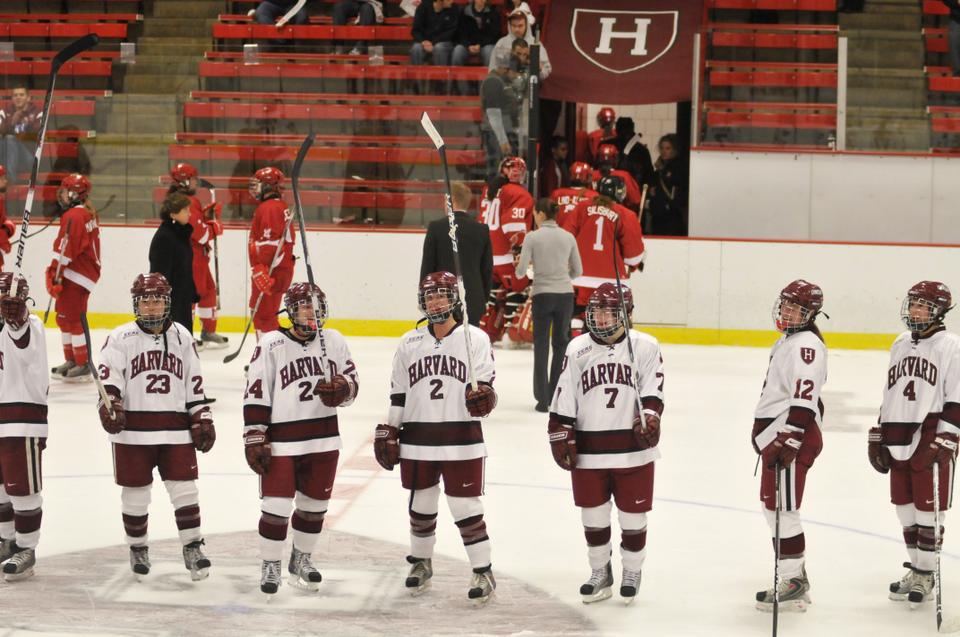
News
Summers Will Not Finish Semester of Teaching as Harvard Investigates Epstein Ties

News
Harvard College Students Report Favoring Divestment from Israel in HUA Survey

News
‘He Should Resign’: Harvard Undergrads Take Hard Line Against Summers Over Epstein Scandal

News
Harvard To Launch New Investigation Into Epstein’s Ties to Summers, Other University Affiliates

News
Harvard Students To Vote on Divestment From Israel in Inaugural HUA Election Survey
Fresh Faces Bring New Talents To an Old Mentality

The ninth-ranked Harvard women’s hockey team, having won the previous two ECAC Hockey regular-season and Ivy League titles, looks to continue a tradition of success in the 2009-10 season. Despite having graduated its top three offensive contributors last year, the Crimson plans to capitalize on what has always made it one of the most competitive teams in the nation: speed, creativity, and grit.
“Our biggest focus is to not focus on what we lost,” co-captain Cori Bassett says, “but [on] what we have at this point. It’s hard to look back because we lost an Olympian and our top scorers. Now, we’re looking for everyone to contribute offensively and defensively.”
Harvard finished the 2008-09 season 19-10-3 overall with a disappointing loss to Rensselaer in the semifinal round of the ECAC tournament. The final outcome left the Crimson counting down the days until its return to Harvard’s Bright Hockey Center and another opportunity to make it back to the NCAA Tournament.
The Crimson will have to face opponents this year without its top three scorers from last season—Sarah Vaillancourt ’08-’09, Jenny Brine ’09, and Sarah Wilson ’09. While the personnel may be different—as well as younger, with seven freshmen joining the squad—Harvard’s basic strategy will remain the same.
“One of the things we’ve always had in the past is speed,” co-captain Kathryn Farni says. “And it is something that we still have this year, so that is going to continue to be our focus; to drive to the net hard.”
Harvard coach Katey Stone begins her 16th season at the helm of the Crimson. Stone ranks second in all-time wins among Division I head coaches with 319 career victories. She has a definitive coaching style that demands hard work and calls for improvisation from every player.
“Coach has given us a lot of systems to run,” Bassett says. “But [she] has left a lot of the creativity to us, in terms of [the] offensive zone and how we forecheck and what we do once we have the puck.”
Each year’s team brings different skills and talents to the rink, and this year Harvard will look to each individual to step up and fulfill her role on the team. The Crimson’s approach to finding the net this season may look different than in years past, as Stone will tinker her game plan to cater to the strengths of her current crop of players.
“We’re looking to probably score a lot of second- and third-chance goals versus the clean transition goal that in the past we’ve been able to score,” Stone says. “However, I would say we’re looking to create a lot more offense from our blue line because we’ve got some kids who can shoot the puck.”
That blue-line effort will be anchored by Bassett and Farni, along with junior Leanna Coskren. Bassett was the team’s top-scoring defenseman last season, recording 14 points despite missing five games with an injury.
But the Crimson is strongest in net, where senior Christina Kessler will once again take her place between the pipes. Kessler, an All-American in her sophomore season, has been the top netminder in the ECAC for two years running and posts a career .941 save percentage and 1.35 goals-against average.
In addition to junior Katharine Chute—Harvard’s leading returning scorer from last season—the team is bringing in a string of talented freshmen, including three forwards, three defensemen, and one goalie. Having graduated the core of its offense from last season, there is a huge opportunity for anyone, including the rookies, to step up and define her role on the team.
“At the end of the game, we’re not going to be looking to that one person to score the goal,” Farni says. “We’re going to be rolling all three lines. And [we’re] all going to have to take it on ourselves and then just see who’s going to be the one to put it into action on the ice.”
This season presents a lot of new challenges and possible opportunities for the team, aside from the obvious personnel changes. The new academic calendar meant returning to campus and starting a rigorous training schedule earlier than in years past.
“This is the longest preseason we have had because we came back so much earlier this year,” Bassett says. “So we’ve had a lot of time [to] get to know each other really well, and we just can’t wait to start playing games.”
The fact that it is an Olympic year means that the face of the whole league is changing and casting some uncertainty over the competition that Harvard will come up against in its typically challenging schedule.
“It’s not like people’s star players are necessarily returning this year,” Farni explains. “We’re going to see a lot of unexpected teams do well and a lot of team’s who normally do well, not perform as well as expected. It’s not rebuilding necessarily, it’s just taking time to figure out the new dynamic of the team and of the whole league.”
Want to keep up with breaking news? Subscribe to our email newsletter.
